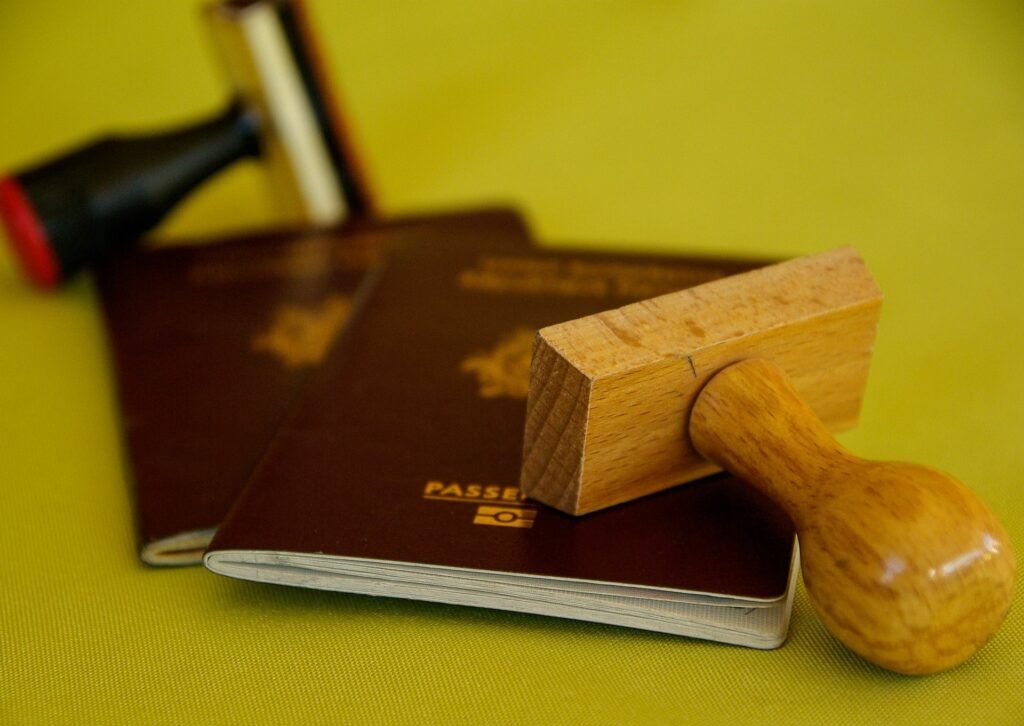As a Portuguese person living in the United States, I’ve had to explain Portuguese names (and Portuguese naming conventions) to lots of Americans. Now that I’m expecting a half-Portuguese, half-American baby, the topic of names has been the focus of lots of questions and explanations. The English language three-name convention (first, middle, last) is virtually unheard of in Portugal. In Portugal, it isn’t uncommon to have four, five or even six names! This post will explain how Portuguese names are formed. Looking to add a Portuguese touch to your children’s names? This is a good place to start. For my non-Portuguese readers, this post will explain why your Portuguese friends have such long names!…

“So… which one is your actual last name?”
When English speakers try to break down a Portuguese name – for example José Maria Almeida de Pais Vieira – into first, middle and last, they will struggle. Portuguese names are divided into first names (nomes próprios) and last names (apelidos) only. In this case, José Maria is the first name and Almeida de Pais Vieira is the last name. But… “Which one is your actual last name?”, people will often ask.
Portuguese last names are formed from family names, which is really lovely as it celebrates the heritage from both sides of the family. In the example above, Almeida is José Maria’s mother’s last name and de Pais Vieira is the father’s last name. If José Maria were to have a sister, she might be called something like Daniela Almeida de Pais Vieira, or Ana Rita Almeida de Pais Vieira. José Maria’s daughter might be named Leonor Pereira de Pais Vieira (Pereira being the mother’s last name). According to law, you can only have a maximum of six names: up to two first names and up to four family names. But each name can be either a simple (i.e. Daniela, or Almeida) or composite names (i.e. Ana Rita, or de Pais Vieira).

Getting Married? Changing Your Name?
The other thing that may surprise those of Anglo-Saxon roots is that in Portugal it isn’t “expected” that a woman will change her name when she gets married. That’s right: the classic security question asking what your mother’s maiden name is not something you really see in Portugal. This is because your mother may very well still be using the name she was given at birth. If a woman (or man) decides to take their spouse’s name when they marry, they aren’t allowed to drop their current name, but they will simply tack on their spouse’s last name to their existing name. That’s right: an already comparatively long name will get even longer! In 2014, for example, only around 41% of women who married chose to take on their husband’s name. Men have legally been able to change their last name to their wife’s last name since the late 1970s. In 2014, approximately 4% of men in Portugal did so.

Naming Your Baby
In order to protect children from a lifetime of teasing/legal challenges, Portugal (like several other countries) has a list of approved names that you must abide by to name your child. Additionally, some names are allowed for only one gender. So no matter how much you want to name your baby boy “Elizabeth”, it’s not allowed in Portugal – trust me, he’ll be grateful for this law when he starts going to school. You’re also not allowed to name your child Sayonara, Warrior, or Apple. The good news for parents who prefer less conventional names, or parents of half-Portuguese children who want to give their child a non-Portuguese name, a large number of new, permitted names were added to the list in 2017. Wondering if your name is allowed in Portugal? You can consult the list here.
I hope this post has helped my non-Portuguese readers come to appreciate the art of Portuguese names. It can be tricky combining two different naming cultures (while still staying true to both), or incorporating some of your family’s heritage in a society that is unfamiliar with those norms and names. If you’ve gone through this yourself, please let me know how you came to a decision, in the comments section below. I’d love to hear it!
*The above post is not meant to serve as legal advice, and rules & regulations may be subject to change at any time.



Wow! Good job with the simple explanation. In reality, it can be more complicated. I know some people that give their names in the Spanish manner, father’s surname first then mother’s. There appears to be no hard and fast rule. Then again, those people without a named father end up with something like Lopes e Lopes. Having lived many years in both Portugal and Latin America, I have been known as Vieira Teixeira and Teixeira Vieira and in the Dominican Republic, I had to add Ventura Rodrigues for a few documents. Despite all the pomp regarding my surnames, I’m just a woman who cultivates Yew trees and eats scallops.
Oh my goodness! That sounds very complicated down there.
Although there are no rigorous rules regarding mother or father name order, it generally tends to be mother first, then father. But I didn’t want to go into all the exceptions as it would only confuse beginners! 😀
I recently had my name questioned from the passport office. My full legal name is Teresinha de Jesus Pimentel Santos. (Pimentel from moms side and Santos from dads) Before processing my passport, I was called at work and asked if my surname is Pimentel or Santos. I have always used Santos ( my dads) surname as mine as well. I am working on my family tree and rules with Portuguese surnames definitely don’t always apply. ( this makes research really hard) In fact, some of my fathers siblings have different last names but all are from the same mother and father. My father’s surname is Santos, brother is dos Santos and other brother got legally stuck with the family ‘nickname’ Macaroco. My father’s sisters are Amaral (their mothers surname) Through my research and talking to other genealogists I have learned that a child could have also been given the surname of another relative of the family that they wanted to honour.
This article about names was interesting. Thanks for sharing.
Thank you for sharing your experience as well! It’s definitely true that – at least back in the day – you could’ve been given someone else’s last name (I.e. your godfather). I think nowadays they’re a little stricter but you can give your child a previous relative’s last name, provided you have evidence that that particular name once ran in the family (that’s my understanding at least).
Interesting, thank you! My Grandfather was from Cavalieros de Baixo in Portugal, and I am fascinated by all things Portuguese. He wanted a name for my Mother that was the same in Portuguese and English, so they chose Anna Marie. I have been told that my name is Portuguese, but I see Laurinda on the list you linked to, but not Lorinda. I guess it was Americanized some in the spelling. I had wondered about that, as I have a cousin in Portugal named Laurindo.
That makes sense: a lot of Portuguese names have become Americanized with time and the English “au” sounds a lot like “o”. Thanks for sharing your story here!